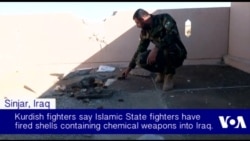Kurdish fighters tell VOA that Islamic State (IS) fighters in recent days fired mortars containing chemical materials into northern Iraq. They complain of vomiting and nausea after breathing in the chemicals.
“I felt sick and my eyes hurt so badly,” said Bedel Osman, a Peshmerga fighter. “I vomited and was taken to the hospital. When I came back to my outpost, I saw several other colleagues suffering from the same thing.”
Another Kurdish fighter said he saw troops vomiting and having difficulty breathing.
“The mortars hit near us but they didn’t explode,” said Nuri Ibrahim, a Peshmerga fighter. “A strange smell was coming from those unexploded mortar rockets. This was when we all began to vomit and felt nauseous.”
VOA could not independently confirm the claims.
Investigating reports
The accounts come as Kurdish officials work with the U.S.-led coalition to verify that IS militants hit Kurdish Peshmerga fighters with mortars containing chemical materials outside Sinjar, an Iraqi town that was liberated from IS late last year. There are still occasional skirmishes on the outskirts of the city.
According to the Kurdish authority, it would be the eighth chemical weapon attack on its forces.
Kurdish officials say IS has increased its attacks with chemical weapons after losing territory.
“They resort to such tactics when they lose control of territory,” said Luqman Ibrahim, a Peshmerga [Kurdish forces in Iraq] commander in Sinjar.
He told VOA that IS has a highly experienced team of bomb-making experts who develop projectiles armed with chemicals. He said IS has multiple factories in Tel Afar, an IS-held town in the Nineveh province.
Kurdish commanders say at least 50 Peshmerga fighters were affected by the mortar shelling. IS militants also fired into the city, they say.
The Kurdistan Region Security Council said on its Twitter feed that it was investigating last week’s attack.
Little impact
Analysts say they are not surprised by the IS tactics.
“It is obviously an effective tool to terrorize opponents,” said James F. Jeffrey, an analyst at the Washington Institute for Near East Policy.
But Jeffrey, who also served as a U.S. ambassador to Iraq, told VOA that chemical mortar attacks won’t have any strategic impact in the ongoing fight against IS.
U.S. officials have said that IS has used chemical weapons in Syria and Iraq in the past.
U.S. Director of National Intelligence James Clapper told Congress in early February that the extremist group had used chemical agents in both Iraq and Syria.
CIA Director John Brennan later confirmed that IS had the ability to manufacture both chlorine and mustard gas.
A source at the Organization for the Prohibition of Chemical Weapons told Reuters earlier in the month that lab tests showed Kurdish fighters had been exposed to mustard gas last year.














